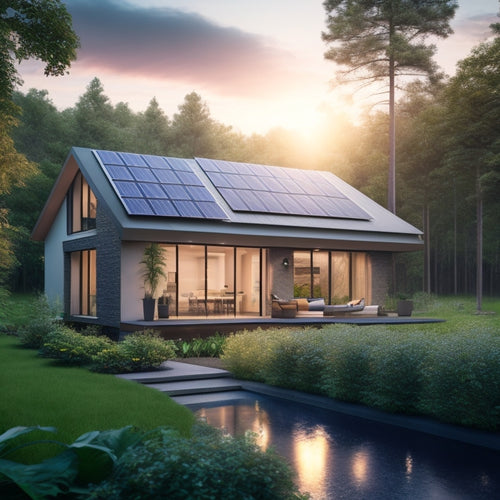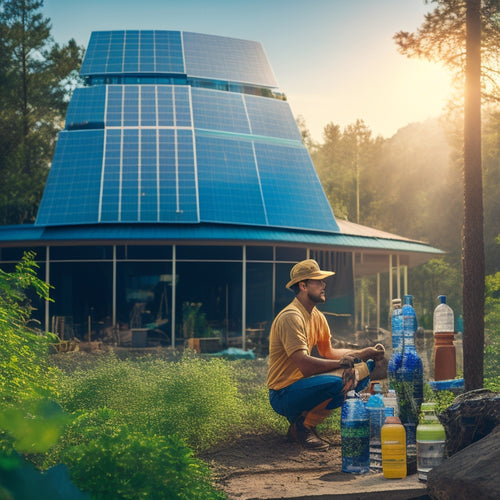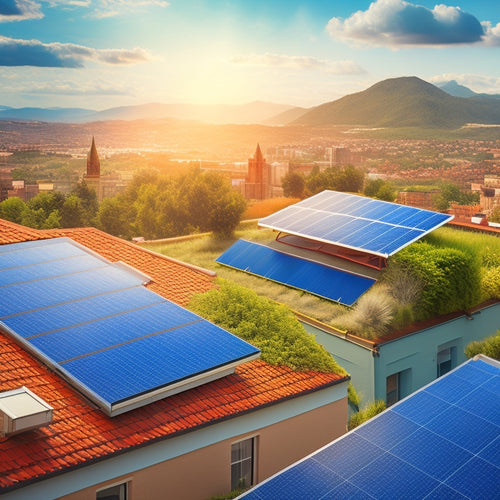
What's Your Geothermal Heating System's True Cost?
Share
Your geothermal heating system's true cost goes beyond the initial installation price, encompassing factors like system type, installation complexity, location, and equipment quality that can drive up the overall expense. You'll need to evaluate the cost of drilling, piping, and equipment, which can add $10,000 to $20,000 to your bill. Additionally, factors like system size, permits, and local regulations will impact your bottom line. With ongoing expenses averaging between $1,000 and $3,000 annually, it's crucial to understand the full scope of your investment to make informed decisions; as you investigate the specifics, you'll uncover a more accurate estimate of your system's total cost.
Key Takeaways
- The true cost of a geothermal heating system includes initial investment, installation, and ongoing operation and maintenance expenses.
- System type, size, complexity, and location significantly impact overall costs, with closed-loop systems typically ranging from $15,000 to $30,000.
- Federal tax credits of up to 26% and state/local rebates can reduce the upfront investment, while utility discounts and time-of-use pricing optimize energy consumption.
- Long-term savings come from significant reductions in energy consumption, leading to lower costs and environmental impact, as well as increased property value.
- Accurate cost estimation and understanding of factors affecting system pricing are crucial for project feasibility assessment and budget planning.
Understanding Geothermal System Costs
When evaluating a geothermal heating system, understanding the costs involved is essential for determining its feasibility for your project. You need to take into account the specific type of geothermal system you're installing, as different systems have varying cost structures.
For instance, a closed-loop system typically requires more piping and excavation, increasing installation costs. On the other hand, an open-loop system may require more permits and water treatment, adding to its overall expense.
Geothermal energy, as a renewable energy solution utilizes Earth's subsurface heat, provides a stable power source and can be particularly beneficial for fleet owners looking to reduce their carbon footprint.
Installation challenges, such as drilling depths and soil conditions, also impact the final cost. By understanding these factors, you can accurately estimate the costs of your geothermal system and make an informed decision about its viability for your project.
Factors Affecting System Pricing
Several key factors converge to determine the final cost of a geothermal heating system. As you consider investing in this eco-friendly solution, it's vital to understand the variables that impact pricing.
System size is a significant factor, as larger systems require more materials and labor. Installation complexity also plays an important role, with more intricate designs or unique site conditions driving up costs.
Your location and local regulations can also influence pricing, as permits and inspections may be required. Additionally, the type and quality of equipment you choose will affect the overall cost. For instance, selecting high-efficiency solar panels with high efficiency rates can reduce energy consumption and lower costs in the long run.
Moreover, implementing energy efficiency measures, such as optimizing routes and reducing fuel consumption, can also contribute to a more affordable system. By understanding these factors, you can make informed decisions and optimize your geothermal heating system's pricing.
Initial Investment and Expenses
Now that you've reflected on the factors affecting system pricing, you're likely wondering what the initial investment and expenses of a geothermal heating system will be. The upfront costs vary depending on the system type you choose.
For instance, a closed-loop system typically costs between $15,000 and $30,000, while an open-loop system can range from $20,000 to $40,000.
The installation process also plays a significant role in the initial investment. You'll need to take into account the cost of drilling or digging, piping, and equipment installation, which can add up to $10,000 to $20,000.
Additionally, you may need to contemplate the cost of backup systems, such as heat pumps or boilers, which can add another $5,000 to $10,000 to the total bill.
Similar to commercial EV charging stations, the complexity of the installation, accessibility, and permits can also impact the costs solar-powered systems, and it's crucial to research and understand the factors that influence the overall expense.
Ongoing Operation and Maintenance
Most geothermal heating systems require minimal ongoing operation and maintenance, with many homeowners reporting annual expenses of around $1,000 to $3,000.
Similar to solar-powered EV charging stations, regular maintenance is vital to guarantee peak energy efficiency and reduce reliance on non-renewable sources solar panel performance.
You'll need to perform routine checks to guarantee your system's efficiency, which may include inspecting and cleaning the heat exchanger, checking refrigerant levels, and verifying proper system operation.
Regular maintenance frequency will depend on factors like system age, usage, and local regulations.
You may need to replace air filters, clean condenser coils, and inspect piping for signs of wear.
Incentives and Rebate Opportunities
You'll be pleased to know that installing a geothermal heating system can earn you significant incentives and rebates.
At the federal level, you're eligible for a tax credit of up to 26% of the total system cost. Additionally, you may also be able to tap into state and local rebates, which can further reduce your upfront investment.
Furthermore, you can investigate Utility Discounts and Time-of-Use Pricing to optimize your energy consumption and save even more.
Federal Tax Credits
Under the Bipartisan Budget Act of 2018, homeowners and businesses can claim a significant federal tax credit for investing in geothermal heating systems, which can help offset the upfront costs.
This credit can be substantial, making geothermal a more financially viable option for you. To qualify, your system must meet federal guidelines, and you'll need to verify tax eligibility.
Here's how it breaks down:
-
26% tax credit: You can claim 26% of the total cost of your geothermal heating system as a tax credit.
-
No upper limit: There's no cap on the amount you can claim, making this credit particularly beneficial for larger systems.
-
Carryover period: If you can't claim the full credit in one year, you can carry it over for up to 20 years.
- Apply to both residential and commercial systems: Both homeowners and businesses can take advantage of this credit, making geothermal a more accessible option for all.
State and Local
Two dozen states and hundreds of local governments offer incentives and rebates to encourage the adoption of geothermal heating systems, further reducing the financial burden of installation.
You'll want to research the state regulations in your area to see what's available. Some states offer direct rebates, while others provide low-interest loans or property tax exemptions.
Local incentives can also vary widely, from rebates on installation costs to reduced permit fees. Be sure to factor these benefits into your overall cost calculation.
Long-Term Savings and Benefits
As geothermal heating systems begin to pay for themselves through reduced energy bills, the long-term savings and benefits become increasingly apparent.
You'll start to notice significant reductions in your energy consumption, which translates to lower costs and a smaller environmental footprint.
Here are some key advantages of geothermal heating systems:
-
Energy Efficiency: Geothermal systems can achieve up to 400% efficiency, compared to traditional HVAC systems which typically operate at around 90% efficiency.
-
Environmental Impact: By using the natural heat of the earth, geothermal systems reduce greenhouse gas emissions and minimize your carbon footprint.
-
Increased Property Value: Installing a geothermal system can increase your property value, making it more attractive to potential buyers.
- Low Maintenance: Geothermal systems have fewer moving parts, reducing the need for frequent repairs and maintenance.
Frequently Asked Questions
Can I Install a Geothermal System in an Existing Home?
You can install a geothermal system in an existing home, but be prepared for a complex installation process, involving excavation and piping, which affects the overall cost; compare it to traditional HVAC systems to determine the best value.
How Does Geothermal Heating Affect My Home's Resale Value?
You'll be intrigued to know that 77% of homebuyers consider energy efficiency a top priority; with geothermal heating, you'll reap resale benefits, as market demand for eco-friendly homes increases, enhancing your home's value and appeal to freedom-seeking buyers.
Are Geothermal Systems Suitable for Small or Tiny Homes?
You'll find geothermal systems suitable for tiny homes, leveraging tiny home advantages like compact design and efficient land use, as geothermal energy efficiency excels in small spaces, providing ideal, eco-friendly heating and cooling for your freedom-focused lifestyle.
Can I Use a Geothermal System With a Radiant Floor?
You can pair a geothermal system with a radiant floor, optimizing radiant efficiency by ensuring proper installation considerations, such as insulation, piping layout, and fluid flow rates, to achieve maximum warmth and comfort in your free-spirited abode.
Do Geothermal Systems Work Well in Cold Climates?
As you venture into the frigid terrain, you'll find geothermal systems shining like a guiding light of warmth, boasting impressive geothermal efficiency that defies the chill, with cold climate performance that's nothing short of extraordinary, keeping you cozy and free from the shackles of traditional heating.
Related Posts
-

3 Best Eco-Grants for Home Energy Upgrades
You're eligible for various eco-grants that can help you cut down on energy bills and reduce your carbon footprint by...
-

What Tax Deductions Apply to Sustainable Building Materials?
You can claim various tax deductions for sustainable building materials, thanks to over 40 federal tax incentives sup...
-

What Roofing Materials Best Protect Our Planet?
As you consider the environmental impact of your building, you're likely to find that the roofing material you choose...


